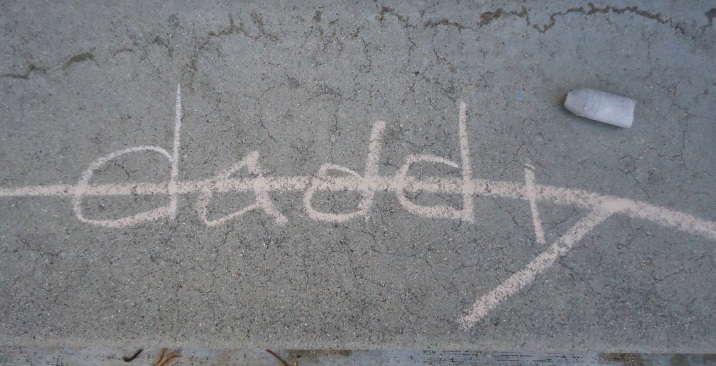
“Speak when you are angry and you will make the best speech you will ever regret.” ~Ambrose Bierce
Not too long ago, my 7-year-old son, Jacob, used sidewalk-chalk to write a message to me on the backyard patio, complete with illustrations of the two of us playing together.
He wanted me to see it as soon as I came home from work, so to make sure, as soon as I drove up, he ran outside to take me to it.
I hugged him and told him how much I loved it . He beamed.
Later, he got mad at me (I don’t remember why anymore) and in a fit of anger, drew a line through my name with chalk.
I have to admit that I was taken aback just a bit. That was the first time he had done something like that in anger, so I was a little surprised.
Noticing my reaction, Jacob ran off. A few minutes later, he was bawling inconsolably.
It took about an hour before he was ready tell me what had happened.
Evidently, Jacob felt bad about crossing my name out, so he got a pencil to try to erase the “X” mark across my name. He had vainly erased until not only was the eraser gone, but the metal ring that holds the eraser to the pencil was filed down as well.
His attempt to rectify the impetuous expression of anger failed.
So he started sobbing.
Three Lessons
1. It’s always better to avoid impetuous expressions of anger because the things said or done cannot always be erased. They can linger in hearts and gather steam with the pressure of time, memory and imagination. If we’re not careful, small stings can easily become insurmountable obstacles to love and kindness. Self-control is better than trying to rebuild what we broke apart on impulse.
2. The sincerity of a person’s regret can be assessed by the degree to which the person actually tries to erase the damage. If, as one author has said, you’ve behaved yourself into a problem, don’t expect to talk your way out of it. Words are inadequate currency to pay for the damage behavior causes.
3. Home is a good place to learn lessons like these. This dad picked up his crying son and held him tight and told him how much he was loved and how much he was thought of for even trying to erase the mistake, and that we can always start over fresh and new. Life is a school ground. Moments like these are the lessons meant to instruct us. And that’s the way it’s supposed to be.
And so my son made a new sign with sidewalk chalk with a new and longer message to his daddy.
That one stayed much longer than the first (even after rain had washed it away).
Buy: 7 Habits of Highly Effective Families
YOUR TURN!
Leave a comment below!
And please share on Twitter and Facebook.







































Hi Ken, Boy is that the truth! I have unfortunately behaved myself into some real humdingers with people. And as nice of a guy as I think I am, I am embarrassed to admit that my “instance of rage” has cost me some dear friendships. And I tend to think I’m pretty easygoing.
What a great reminder. I’m glad you and your son have mended fences and are doing well. As my kids get older, I fear some of those “anger instances” when they do not like the decisions I have made for them. 🙂 Good to know I can survive.
Bryan Thompson recently posted … Why Your Personal Growth Takes Strategy
Hey Bryan! It is such the human impulse to find the shortcut and easy way out. We all try to talk our way out of the conditions we’ve behaved into existence.
But sometimes in those unguarded moments, when our anger gets the best of us, we say or do things that crack the foundations of those relationships. Then it’s easy to want the cracks to just go away, but often, we have to get the putty out and start repairing the cracks.
As for our kids, they are definitely resilient as long as the overwhelming dominant experience they have is a loving, nurturing relationship with us. If that’s the case, they are pretty forgiving of our weaker moments.
So yes, Bryan, there is hope! 🙂
This is a lesson I have learned the hard way. It really takes time to repair the damage that you do after an act of impulsive anger. It hurts and you suffer from it because you wish you could take it back but you can’t and you have to live with the consequences of it. It is rough and not fun. I highly advise against it.
Sebastian Aiden Daniels recently posted … New Website
I totally agree With Sebastian. I’ve made that mistake myself. It was difficult not just for me but for the person who was the victim of my anger. We eventually reconciled, but that may not always be the case.
Dan recently posted … Did You Claim These Yet?
It reminds me of the old axiom, “When we pick up one end of a stick, we pick up the other end as well.” So true, Dan. When we let anger go, we can’t always fix the carnage. Sometimes we can only pray the object of our anger accepts the effort.
Hey there, Sebastian!
Most life lessons have been kicks to my soft side. And yes, you hit on a truism that can’t be shouted from the mountain tops loud or often enough. Repairing the damage anger creates does indeed take time.
Trust has to be reestablished and regularly reconfirmed. Character has to be built and positive traits have to replace negative ones. It won’t be enough to stop screaming at the kids or spouse.
Self-control isn’t the proper Spackle to fill in the cracked and broken relationships. Love and compassion and empathy and respect have to be the glue that binds the wounds anger inflicts.
But such things are so much more difficult than an apology or two. But I like you solution: Never crack the foundation to begin with. What a concept! 😉
Life is definitely a school ground, Ken. And so long as the right teachers are available, it is smooth sailing. Please give your son a hug from me.
I distinctly recall, when I was about five, an incident happened. (Don’t ask what..I’ll only tell you when we meet!). And my Mom and Uncle, each individually told me something I’ll never forget, something I consider a non-negotiable rule of life. Never react when angry. Ever. We’re different people when we’re mad at something. Impulse is okay in a positive way, but not when we are practically irresponsible when we strike back in anger.
Most people who know me think I am incapable of anger. Fact is, I simply set it aside and get involved in some sort of physical labor (one of the reasons my house is well maintained – talk about benefits!). I just go tackle the laundry or the kitchen sink or scrub the bathrooms or vacuum the house – or just clean something on my rather long to-do list. Or just go for a brisk walk. I sleep over it – and when I wake up, everything looks so different, so much better and the negative is minimized.
I take the “for every minute of anger, we lose sixty seconds of happiness” very seriously.
Lovely post. Short and sweet and packed with wisdom as always.
Hugs, Vidya
(I emailed ya back!)
Vidya Sury recently posted … Acing The Learning Curve And Collecting Smiles
Hello, my dear friend!
Consider my son hugged! Thank you for that. We are a hugging family, so it doesn’t take long before another round of hugs goes around for some reason or no particular reason at all.
Well, if I can’t ask what you were told until we meet, you’ll just have to start the long swim over sooner than expected! 😉
I have a new master plan, Vidya. When you are able to finally make it over for a visit, I’ll invite you to our place, get you angry, then leave some cleaning supplies lying around while I go take a nap or something. Just hope you’re not creating a perverse incentive to get you angry at home! Haha!
Personally, I like to work out when I get angry or frustrated. So much pent up energy can clog things up. So getting the emotions out that way frees me to look at things more rationally.
Hugs back, Vidya.
PS: Thanks for the email. I loved your thoughts and have been slowly digesting them. I’m meeting up with my designer (Mom!) next week to work on some of your suggestions. As soon as I’m done, I’ll get to launching the thing!
Aw, that’s so sweet Ken!
I’m learning about the importance of anger and the permission to express it. If we don’t allow our children to express their anger, they will grow up to be us 😉 Yet parents are so upset by their children’s anger and don’t know what to do about it! I watch my sister’s grandson display anger for the first time and the looks on the faces of his parents and aunts was telling. We need to be so careful about that.
Where in the parenting books is there a chapter on dealing with anger, discussing the healthy expression of it? I don’t think it’s there. We need to dialogue about it more. It’s so important!
Lori
Lori Gosselin recently posted … Is Meditation the Only Way to Realize Divinity?
You make such a great point, Lori. We certainly need to teach our kids how to express their anger. Keeping it bottled up does not lead to great things. We do need to create an atmosphere of acceptance at home where it’s safe to express our anger, even at parents. When they are not allowed, all that junk turns inward and often emerges in the form of neuroses or physical ailments.
I bet there are some good books on the subject, but like you, I haven’t heard much about them. They need to be standard reading.
Thanks so much for raising that issue, Lori. An ongoing dialogue is definitely needed. Hey, you get some awesome conversations on the Porch. Do I hear something coming soon on this topic?
I like that idea of addressing hurtful actions with healing actions. I’m going to remember that to share with my own kids.
Britt Reints recently posted … Hard Happiness Truth: We Are Our Mistakes
Hi Britt! “Addressing hurtful actions with healing actions.” I like that. Forgiveness for offense. Love for hate. Peace for anger. Lucky kids you have, Britt.
PS: I love the photo! There is so much joy exuding from that little square!
Great post. This is a difficult subject, because expressing anger appropriately is such an important skill. Not having the freedom and guidance to do so can lead down two paths: committing offences or becoming too “nice” (read: fake)
Thanks Dan! Expressing anger appropriate is important, but so easy to do in a way that shuts people down and closes them off. It is a skill that requires lots of conscientious effort for most of us to master. But when we do, we can clear lines and open dialogue and return to love with an ease that explosive outbursts never allow.
Thanks so much for the insight, Dan.
Teaching our children how to handle and express anger is such an important job and one, I think, that many of us probably forget about in the daily stuff of life. I know I find myself thinking “aaaack, not like that” right in the middle of a disagreement with my daughter or with my husband when she’s watching. It’s a real eye-opener to see yourself and your reactions through the eyes of one who is learning. We all have “wrong” ways that we react and express ourselves in times of anger or upset. Sometimes part of the lesson is admitting when a behavior is not appropriate and explaining what a better way might be in the future. That’s something else kids can learn – that when we do behave other than we might want to, we have to own up to it and make any necessary amends.
Lisa recently posted … Why My Wife is Awesome – A Guest Post by Fab Hub
Great point, Lisa! We know what we know, but do what we’ve always done, right? Like you say, deep in the “daily stuff of life,” we often fall into default ways of living and acting. It’s interesting how knowing our children are watching, we become much more cognizant of our foibles than when they are not present. I’m the same way.
But it’s a powerful call to action as well. If, that is, we’re willing to be called. Like my wife has said before, our son teaches us at least as much as we teach him.
I also like your last point: teaching our kids to own up to their mistakes by us owning our own and making amends.
Great comment, Lisa! Important stuff!
For many checking anger is aquired over time , if at all. There is no advantage to it.
Think before you act, then think again . People are watching how you handle situations alot of the time those people are your kids….
That’s so true, John. We are constantly teaching our kids what it means to be a man or woman. We teach them about people and emotions and human decency by virtue of our examples. As a matter of fact, our examples speak so much louder than our words.
Thanks for making that point.
Lovely post Ken. I love the way that you use real life situations to spread your message of happiness. I am sure that Jacob has learned a good lesson early on in life and at no cost to him. Life is always a little harder on us than our parents are 🙂
Neil Butterfield recently posted … Blood Sugar: Food Advertising Makes You Fat
Haha! I love that line, Neil: “Life is always a little harder on us than our parents are.” I suspect that’s true for all who have relatively decent parents.
There is so much going on in life all the time to draw life lessons from to spread that message of happiness, for sure. Glad you find value in it, Neil.